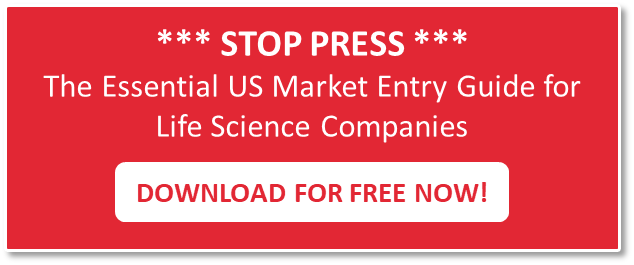Gain expert insights on navigating the FDA approval/market clearance process and successfully enter the U.S. healthcare market as an overseas innovator.
Gaining approval or market clearance from the U.S. Food and Drug Administration (FDA) for pharmaceuticals, medical devices, or other health-related products is a rigorous and often challenging process, especially for companies based in the UK and Europe (or any non-U.S. country) that aim to enter the U.S. market.
In this article, we explore the key challenges they may face and provide recommendations for developing a strategic approach to compliance, building a robust application, and engaging effectively with the FDA to streamline the process.
1. Regulatory Differences
Differing Standards and Requirements
The FDA has its own set of regulatory requirements and recognized standards that can differ significantly from those in the UK (regulated by the MHRA – Medicines and Healthcare products Regulatory Agency) and the EU (regulated by the EMA – European Medicines Agency and other notified bodies for medical devices).
For instance, a UK biotech may have to justify patient selection for their clinical trial data to match FDA-specific demographic requirements or a German medtech might face stricter FDA manufacturing or supplier controls that are not covered in their EU certifications.
Adaptation of Clinical Data
Clinical data obtained from trials conducted in the UK or EU may not always be directly applicable or acceptable for FDA review. Due to cultural, dietary and genetic differences, there may be a need for additional trials or bridging studies to meet FDA requirements. This is a complex subject in its own right and you may wish to check out this article which takes a deep dive into the differences “From MHRA/EMA to FDA: Navigating the Clinical Data Divide for US Market Access”
2. Legal and Procedural Hurdles
Navigating Legal Frameworks
Understanding and complying with U.S. laws, regulations, and guidelines can be complex, and often requires the assistance of U.S.-based legal and regulatory consultants. For access to these US experts contact GTM to arrange a free initial consultation.
For a more detailed analysis of the legal frameworks you’ll need to understand, read this informative article “The UK/EU Life Sciences Guide to U.S. Legal Frameworks”.
Intellectual Property Concerns
The protection of intellectual property rights can be different in the U.S., and companies need to ensure their patents and trademarks are secure within the U.S. legal framework. GTM partners with US legal and IP experts who can provide invaluable advice and guidance at the planning and execution stage. Contact GTM to arrange a consultation.
To safeguard your competitive edge and find out how to navigate the complex legal IP landscape, check out this more detailed analysis “Intellectual Property in Life Sciences: Strategies for U.S. Market Entry”.
3. Financial and Resource Constraints
Cost Implications
The process to gain FDA approval for importing medical products presents substantial financial and resource challenges for non-U.S. companies. These include the high costs associated with conducting additional clinical trials to meet FDA standards, legal and user fees for navigating U.S. regulations, consultancy fees for regulatory guidance, and the significant expenses involved in establishing a U.S. presence. Operational costs can also escalate as companies adapt manufacturing processes and supply chains to comply with stringent FDA rules.
Time Investment
Moreover, the complexity of the US FDA review process implies opportunity costs due to delayed market entry, with the added risk that the investment may not result being able to enter the market. Hence, companies must undertake careful financial planning and risk mitigation when deciding to pursue market entry in the U.S., considering both the direct costs of FDA submissions and the indirect costs associated with market delay and potential regulatory hurdles.
4. Logistical and Operational Challenges
Establishing U.S. Operations
Companies often need to set up operations within the U.S., including manufacturing or distribution facilities that meet the FDA’s Current Good Manufacturing Practice (cGMP) & Good Distribution Practices (GDP) regulations, which can be a significant undertaking.
As a result, many companies leverage Contract Manufacturing Organizations (CMOs) that have established FDA-compliant facilities. By engaging in such collaborations, companies can avoid the substantial investments of time and capital required to build and validate their own manufacturing sites, ensuring a more efficient path to compliance and market entry.
“When establishing a business in the United States, it’s critical to meticulously weigh your options concerning the type of entity you form, the state in which you register, and the location of your operations. Each state has its own regulatory environment, tax implications, and business incentives, which can significantly impact your company’s success and compliance. A strategic approach to these foundational decisions can set the stage for sustainable growth and legal fortitude in the American market.”

Thomas Thorelli
Partner, Thorelli & Associates
Moreover, these partnerships provide access to experienced manufacturing processes, quality control systems, and pre-existing supply chains, significantly reducing the complexity of managing operations in line with stringent FDA standards. While the responsibility for cGMP compliance ultimately remains with the legal manufacturer, utilizing an experienced CMO can facilitate a quicker market launch. This approach not only offers cost savings by eliminating the need to construct and maintain dedicated facilities but also provides the flexibility to scale production based on fluctuating market demands, enhancing the overall efficiency and competitiveness of the company in the U.S. market.
Supply Chain Management
Adjusting and ensuring a supply chain is managed to be FDA requirements for quality and traceability can be challenging, especially if components or materials are sourced from various international locations. Managing a supply chain for FDA compliance involves a complex interplay of quality control, traceability, supplier management, and adaptability. Companies must establish comprehensive strategies and systems to ensure that every aspect of their supply chain is compliant with FDA standards and capable of withstanding scrutiny. This can be particularly challenging if components or materials are sourced from various international locations.
It is worth noting that this not only ensures regulatory compliance but also builds trust with consumers and protects the company’s brand reputation.
5. Cultural and Communication Issues
Understanding U.S. Market
UK and European companies venturing into the U.S. market must navigate a landscape marked by diverse consumer preferences, distinct distribution channels, and unique marketing communication styles. Adapting to U.S. cultural norms and regional variations is crucial, as is understanding the competitive environment and high customer service expectations.
Regulatory and legal frameworks also differ, requiring careful consideration in advertising and product claims. Comprehensive market research and local insights are vital for tailoring products and strategies to fit the multifaceted American market, ensuring not only compliance but also resonance with the target audience.
To help you craft a winning strategy checkout this article “The US Life Sciences Marketing Challenge” an essential read for Life Science business owners and marketers.
Communication with the FDA

Effective communication with the Food and Drug Administration (FDA) is a pivotal aspect of successfully navigating the regulatory landscape when setting up operations in the U.S. The FDA is responsible for protecting public health by ensuring the safety, efficacy, and security of drugs, biological products, medical devices, food supply, cosmetics, and products that emit radiation.
It requires a thorough understanding of the regulatory requirements, a strategic approach to address feedback, and a commitment to transparency and thorough documentation. By prioritizing this communication, companies can help ensure a smoother process, avoid costly delays, and establish a foundation for successful product launches in the U.S. market.
Post-Market Surveillance
Post-market surveillance refers to the monitoring of a product after it has been released on the market. This process is critical for ensuring the ongoing safety and effectiveness of the product and is a key regulatory requirement enforced by the FDA. Companies operating in the U.S. market must understand that FDA post-market surveillance requirements can be more stringent than those in their home countries, particularly for those based in the UK or Europe.
“Compliance is not a one-time event; it’s a continuous journey. This is
particularly true when dealing with the FDA. Our role is to keep our clients
ahead of the curve, ensuring ongoing adherence to the highest regulatory
standards.”

Mark Swanson
Partner, QRx Partners
Compliance with post-market surveillance requirements is not only a legal obligation but also an ethical one, as it directly impacts patient and consumer safety. Companies must have robust systems in place to collect, analyse, and report data to the FDA, and they must be prepared to take swift action if a risk to health is identified. Failure to comply with these requirements can result in regulatory enforcement actions, including fines, product seizures, or injunctions against the companies involved.
Strategy and Competition
The U.S. market is often highly competitive. Companies need to have a clear strategy on how to position their product, taking into account the competition from U.S.-based and international firms.
In the highly competitive U.S. market, a well-defined and executed multi-faceted strategy is essential for any company looking to launch and sustain a successful product. The strategy must consider numerous factors, including the nature of the competition, which can come from well-established U.S.-based firms as well as other international players.
“Success in the US market demands more than just an understanding of your product; it requires a nuanced strategy that respects the complexity of regional, cultural, and regulatory landscapes. At gigCMO, we guide UK life sciences firms to align their vision with the unique fabric of the US market for sustainable growth and many have found value by completing our online market readiness audit.“

Mark Magnacca
CEO, gigCMO
Companies must start with comprehensive market research to understand consumer behaviours, market size, and the competitive landscape, including both domestic and international players. It’s essential to differentiate the product through unique selling propositions, whether that be in terms of quality, price, innovation, or customer service. The pricing strategy should reflect the product’s value while considering the competition and market standards.
Developing a strong brand presence is critical, and marketing efforts must be culturally attuned and leverage appropriate channels to reach the target demographic effectively. Selecting the right sales and distribution networks is equally important to ensure product availability where and how consumers prefer to shop. Superior customer service can serve as a competitive advantage, emphasizing the need for robust support systems.

Compliance with U.S. regulations cannot be overlooked, as it plays a role in competitive positioning. Companies should also be agile, ready to innovate, and adapt to market shifts to maintain relevance. A resilient supply chain and strategic partnerships can enhance market penetration and distribution efficiency. Intellectual property rights must be secured and enforced to protect against competitive infringement (see this article for more on IP – “Intellectual Property in Life Sciences: Strategies for U.S. Market Entry”).
Lastly, tapping into local expertise through hiring or consulting services can provide invaluable insights and facilitate smoother navigation of the competitive U.S. business environment. Together, these strategic considerations form the blueprint for not just entering the U.S. market but achieving sustained success.
How to Gain FDA Approval
To address these challenges, UK and European companies often hire U.S.-based regulatory experts, work with partners who understand the local market, and invest significant time and resources into understanding and fulfilling FDA requirements. Success in being able to import and market medical products in the US typically requires meticulous planning, a comprehensive understanding of the regulatory landscape, a strong scientific and clinical foundation for the product, and a strategic approach to market entry.
“The FDA’s regulatory framework is constantly evolving, especially with the rise of digital health technologies. We guide our clients through these changes with proactive strategies to mitigate risk and capitalize on new opportunities.”

Mark Swanson
Partner, QRx Partners
Conclusion
In conclusion, the journey for overseas health innovators is fraught with complexity and challenges, yet it remains a critical step for those looking to expand into the lucrative U.S. healthcare market. By thoroughly understanding FDA regulations, preparing meticulous documentation, and engaging with the FDA’s processes proactively, companies from the UK and Europe can navigate this daunting pathway with greater confidence and efficiency.
It is imperative that companies invest in robust clinical trials, ensure quality manufacturing practices, actively manage the supply chain and foster transparent communication with the FDA. Collaborating with experienced U.S. partners and regulatory consultants can also provide invaluable insights and guidance. Furthermore, staying abreast of evolving FDA requirements and leveraging strategic planning will be key to overcoming the hurdles that lie ahead.
Mastering the US legal requirements, including FDA rules, is not just about gaining access to a new market—it’s about proving the safety and efficacy of innovative health solutions that can make a significant impact on patient lives. By embracing the rigorous standards set by the FDA, overseas health innovators not only contribute to global health advancements but also establish a strong foundation for long-term success and credibility in healthcare industries worldwide.
Remember, the FDA process is a testament to the commitment to excellence and patient safety—a goal that resonates universally across the healthcare sector. As daunting as the process may seem, the rewards of expanding your reach and making a positive impact on health outcomes are profound. The key lies in thorough preparation, strategic action, and unwavering perseverance. With these tools in hand, overseas health innovators are well-equipped to master the US market and emerge as leaders in the global healthcare arena.
Other Useful Resources
Disclaimer: The information provided in this article is for general informational purposes only and should not be construed as professional advice. Readers should not rely on any information contained herein as a substitute for professional guidance and should seek independent expert assistance when making decisions related to transfer pricing or US expansion.

